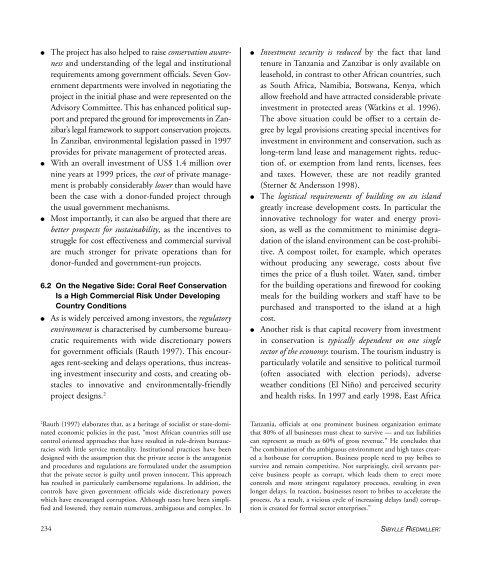Create successful ePaper yourself
Turn your PDF publications into a flip-book with our unique Google optimized e-Paper software.
● Investment security is reduced by the fact that land<br />
● The project has also helped to raise conservation awareness<br />
project designs. 2 and health risks. In 1997 and early 1998, East Africa<br />
and understanding <strong>of</strong> the legal and institutional<br />
requirements among government <strong>of</strong>ficials. Seven Government<br />
departments were involved in negotiating the<br />
project in the initial phase and were represented on the<br />
Advisory Committee. This has enhanced political support<br />
and prepared the ground for improvements in Zanzibar’s<br />
legal framework to support conservation projects.<br />
In Zanzibar, environmental legislation passed in 1997<br />
provides for private management <strong>of</strong> protected areas.<br />
tenure in Tanzania and Zanzibar is only available on<br />
leasehold, in contrast to other African countries, such<br />
as South Africa, Namibia, Botswana, Kenya, which<br />
allow freehold and have attracted considerable private<br />
investment in protected areas (Watkins et al. 1996).<br />
The above situation could be <strong>of</strong>fset to a certain degree<br />
by legal provisions creating special incentives for<br />
investment in environment and conservation, such as<br />
long-term land lease and management rights, reduction<br />
● With an overall investment <strong>of</strong> US$ 1.4 million over<br />
nine years at 1999 prices, the cost <strong>of</strong> private management<br />
is probably considerably lower than would have<br />
<strong>of</strong>, or exemption from land rents, licenses, fees<br />
and taxes. However, these are not readily granted<br />
(Sterner & Andersson 1998).<br />
been the case with a donor-funded project through<br />
the usual government mechanisms.<br />
● The logistical requirements <strong>of</strong> building on an island<br />
greatly increase development costs. In particular the<br />
● Most importantly, it can also be argued that there are<br />
better prospects for sustainability, as the incentives to<br />
struggle for cost effectiveness and commercial survival<br />
are much stronger for private operations than for<br />
donor-funded and government-run projects.<br />
innovative technology for water and energy provision,<br />
as well as the commitment to minimise degradation<br />
<strong>of</strong> the island environment can be cost-prohibitive.<br />
A compost toilet, for example, which operates<br />
without producing any sewerage, costs about five<br />
times the price <strong>of</strong> a flush toilet. Water, sand, timber<br />
6.2 On the Negative Side: <strong>Coral</strong> Reef Conservation<br />
Is a High Commercial Risk Under Developing<br />
Country Conditions<br />
for the building operations and firewood for cooking<br />
meals for the building workers and staff have to be<br />
purchased and transported to the island at a high<br />
● As is widely perceived among investors, the regulatory cost.<br />
environment is characterised by cumbersome bureaucratic<br />
requirements with wide discretionary powers<br />
for government <strong>of</strong>ficials (Rauth 1997). This encourages<br />
rent-seeking and delays operations, thus increasing<br />
investment insecurity and costs, and creating obstacles<br />
to innovative and environmentally-friendly<br />
● Another risk is that capital recovery from investment<br />
in conservation is typically dependent on one single<br />
sector <strong>of</strong> the economy: tourism. The tourism industry is<br />
particularly volatile and sensitive to political turmoil<br />
(<strong>of</strong>ten associated with election periods), adverse<br />
weather conditions (El Niño) and perceived security<br />
2<br />
Rauth (1997) elaborates that, as a heritage <strong>of</strong> socialist or state-dominated<br />
economic policies in the past, “most African countries still use<br />
control oriented approaches that have resulted in rule-driven bureaucracies<br />
with little service mentality. Institutional practices have been<br />
designed with the assumption that the private sector is the antagonist<br />
and procedures and regulations are formulated under the assumption<br />
that the private sector is guilty until proven innocent. This approach<br />
has resulted in particularly cumbersome regulations. In addition, the<br />
controls have given government <strong>of</strong>ficials wide discretionary powers<br />
which have encouraged corruption. Although taxes have been simplified<br />
and lowered, they remain numerous, ambiguous and complex. In<br />
Tanzania, <strong>of</strong>ficials at one prominent business organization estimate<br />
that 80% <strong>of</strong> all businesses must cheat to survive — and tax liabilities<br />
can represent as much as 60% <strong>of</strong> gross revenue.” He concludes that<br />
“the combination <strong>of</strong> the ambiguous environment and high taxes created<br />
a hothouse for corruption. Business people need to pay bribes to<br />
survive and remain competitive. Not surprisingly, civil servants perceive<br />
business people as corrupt, which leads them to erect more<br />
controls and more stringent regulatory processes, resulting in even<br />
longer delays. In reaction, businesses resort to bribes to accelerate the<br />
process. As a result, a vicious cycle <strong>of</strong> increasing delays (and) corruption<br />
is created for formal sector enterprises.”<br />
234<br />
SIBYLLE RIEDMILLER:


















